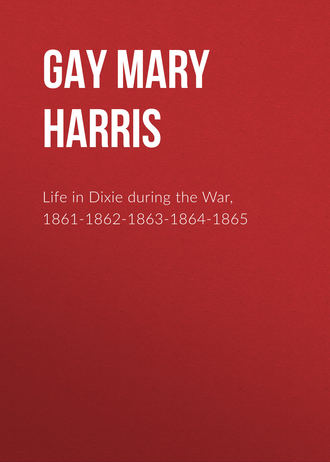 полная версия
полная версияLife in Dixie during the War, 1861-1862-1863-1864-1865
Commendatory notices have also appeared in “The Hampton (Florida) Advocate,” “The Decatur Record,” “The DeKalb County New Era,” “The Wesleyan Christian Advocate,” etc.
The following letter was written to Mr. C. D. Mitchell, Secretary and Treasurer of Chattanooga Plow Company, Chattanooga, Tennessee:
Cincinnati, Ohio, November 30, 1896.My Dear Mitchell – I have read Miss Gay’s book on “Life in Dixie During the War,” and thank you very much for giving me the opportunity to read it. I fancy you will think I am a good deal of a “calf,” but I couldn’t help choking up a good many times as I read of the terrible experience of the poor women and children and helpless aged people when misfortune placed them in the path of the armies during that bloody period, and we who were at the front knew but little of the misery in the wake of the armies.
I was glad to see that Miss Gay speaks kindly of our command, and that we afforded protection to her family without leaving any harm to them in any way.
To-day is the anniversary of the death of her brother, killed in front of our works at Franklin. When I read of his death the whole bloody scene was revived, and how useless and fool-hardy that charge of Cleburne’s over the open cotton fields at Franklin upon our works. The dead were almost countless, and one long grave was dug for all. I well remember this immense trench where the Confederates were laid side by side. I commanded the 1st Batallion that day at the battle of Franklin, and we had a very warm time of it. We retreated on Nashville the following day, and I was cut off from the Regiment for a while, but we finally made a big detour and regained our lines. After the battle of Nashville we occupied the Franklin battlefield, and I went carefully over the whole field. Hood’s charge upon our Franklin works, if successful, would have been a moderate victory only, but unsuccessful, it was a most terrible loss to him.
At 57 you and I look at things rather different than we did in our youth of 22, and while scars of war may be healed, they are nevertheless not forgotten. With kind regards.
Yours very truly,
T. F. Allen.
I think General Garrard would like to read this book, if he has not already done so, and if you approve I will send it up to him and return it to you later. At this season of the year he has time to read.
T. F. A.
1
This lady, Miss “Frank” Whitney, is now the wife of Mr. Charles W. Hubner, the well-known Atlanta poet.
2
This brave officer was killed near Nashville, Tennessee, Dec. 16th, 1864.
3
The fifth and seventh verses are criticisms upon four Southern surgeons, who gave the Federal authorities a certificate that our prisoners were well treated, and our sick well cared for, and that the average loss by death was only four per day.
4
This gentleman, who married sweet Maggie Morgan, (the sister of Dewitt and Billy), has now been Sunday school treasurer for twenty-seven years.
5
One of these poems, “Marching Through Georgia,” we learn by the evidence, was a favorite canticle of Murray, the kidnapper and butcher of Captain Polynesius.
6
“Emel Jay” is Miss Mary L. Jackson, daughter of the late Hon. James Jackson, Chief Justice of the Supreme Court of Georgia.

